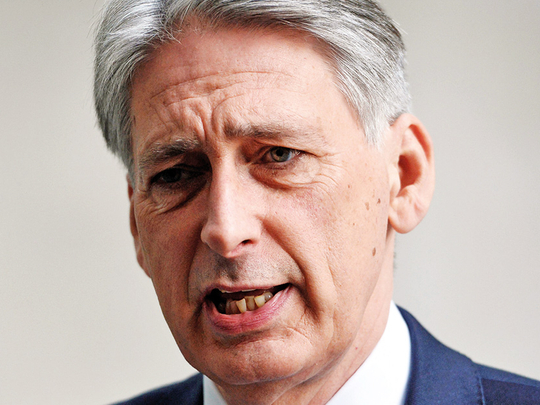
London
Britain’s fiscal deficit unexpectedly widened as inflation saw debt costs rise to the highest for any October in four years.
Net borrowing was £8b compared with £7.5b a year earlier, the Office for National Statistics said Tuesday. Economists had expected it to narrow to £7.1 billion, the median estimate in a Bloomberg survey showed.
Debt costs jumped to £6 billion as rising prices made servicing index-linked bonds more expensive. A 25 per cent increase from October 2016 was the most for the month since 2007.
The figures come as Chancellor of the Exchequer Philip Hammond prepares to announce his annual budget on Wednesday. While the latest snapshot is disappointing, borrowing for 2017-18 as a whole is on course to come in well below the £58 billion officials predicted in March.
In the first seven months, it stood at £38.5 billion, down 9.6 per cent from the same period a year earlier.
The average of independent forecasts is for a deficit of £51 billion in 2017-18. That may be a rare positive in a budget that is expected to see the Office for Budget Responsibility cut its growth forecasts and add more than £30 billion to borrowing in the next four years.
Under Pressure
Hammond is under pressure to loosen austerity after the disastrous general election in June but a widely anticipated downgrade to productivity prospects leaves him little room to do so. Self-imposed fiscal rules require him to reduce structural borrowing to below 2 per cent of national income in 2020-21, with the aim of eliminating the deficit altogether by the mid-2020s.
Spending last month was also pushed higher by net investment, which rose by 26 per cent from a year earlier. On the tax side, growth in VAT was below average and corporation tax receipts were little changed. This was partly offset by the strongest October growth in income-tax revenue since 2007 and an increase in stamp duty on property purchases.
Central government cash borrowing, which determines bond issuance, was in surplus by £6.7 billion in October. The month traditionally sees a surplus due to the timing of tax payments.
Payments on UK inflation-protected bonds are linked to the retail prices index, which rose 4 per cent in the year through October — the most in almost six years.










